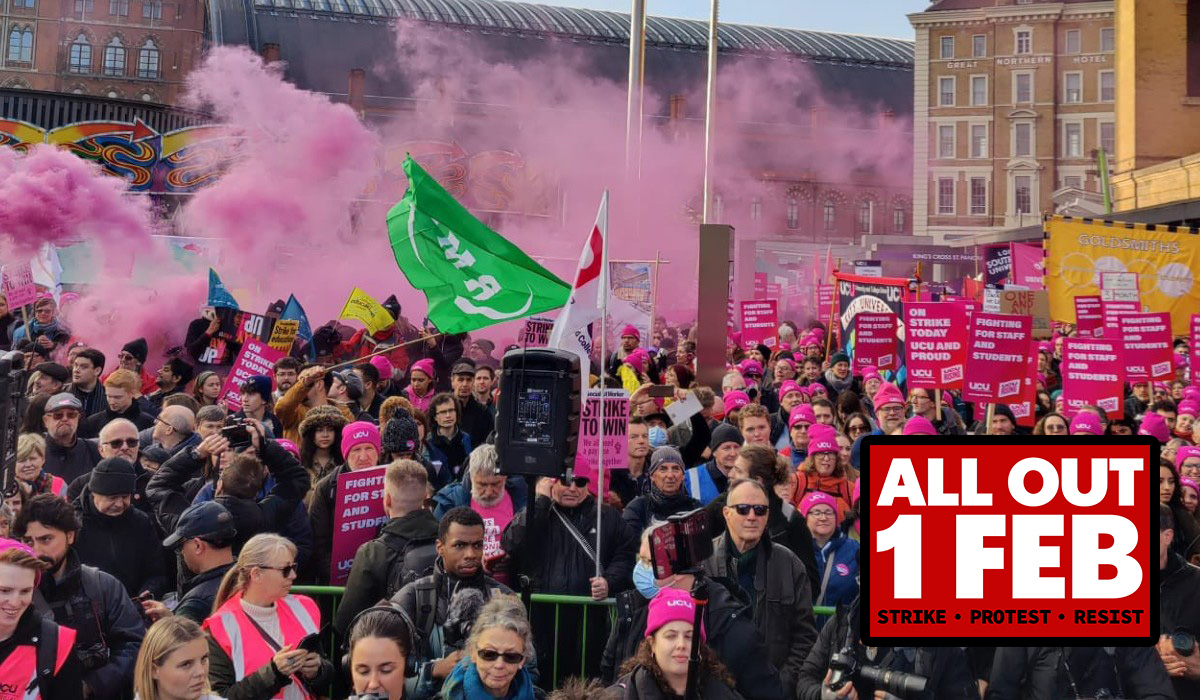 UCU strike rally, London. Photo: @ucu / Twitter
UCU strike rally, London. Photo: @ucu / Twitter
Counterfire’s weekly digest with the latest on strikes and workplace struggles
You can sign up to receive News from the Frontline straight in your inbox
With up to half a million public sector workers striking, 1 February looks set to be the biggest day of UK industrial action in decades. With school closures and massively depleted rail services, these strikes will have a profound resonance among our class.
It’s not just teachers and train workers who are striking, the UCU is leading a walkout of more than 70,000 staff at 150 universities.
The PCS are calling 1 February a national civil service strike. Around 100,000 workers in five departments, including HMRC, will join the walkout.
The NEU are leading this. They cut their teeth as a bold and innovative union during the pandemic. They’re now reaping the rewards of this vigour with over ten thousand new members recruited since the Monday 16 January strike announcements. The NEU aren’t just teaching our kids, they’re providing lessons for the movement.
NEU smash ballot threshold
Teachers in the NEU have delivered a thumping vote in favour of strike action over pay, with over 90% of teachers voting yes, beating the turnout threshold.
The latest pay offers of 5% for teachers and 8% for support staff fall well below inflation and, as with many other public sector workers, will make the spiralling cost of living ever more difficult for thousands of education workers around the country.
This compounds the 24% decline in teacher pay which has happened on the Tories’ watch, and combines with unmanageable workloads and an erosion of school funding, all of which fuels the crisis in teacher recruitment and retention.
Because schools are being forced to take the pay rise out of their own budgets, this is effectively a further cut in funding which will hit support staffing levels and deprive vulnerable children of support and quality learning. This is not just a fight over pay, but a fight for social justice and our children’s future.
Despite the disappointing ballot results in other education unions, and for support staff within the NEU, a staggering 10,000+ have joined the NEU since the ballot result was announced, demonstrating that the desire to fight back is felt everywhere.
Teachers throughout England and Wales will be striking on 1 February and 15-16 March, with a series of regional strikes to take place between 14 February and 2 March.
Picket line perennial Jeremy Corbyn catches the mood when he says:
“When we march with our friends — the teachers, the rail workers, the health workers, the civil servants, the firefighters and the postal workers — we’re also marching for those in poverty. We’re marching for those who live with stress. And we’re marching for the next generation.”
It’s an absolute priority for News from the Frontline readers to agitate and mobilise for the biggest and most united rallies in their area. Moments like this don’t happen often. The TUC and Starmer’s Labour are barely visible. It’s up to us to show them how it’s done. Watch this space for more details.
Train drivers will be out on 1 February
Aslef train drivers will be striking on the 1 and 3 February, alongside RMT train drivers with strikes across 14 rail companies.
Aslef rejected an 8% deal across two years and said the deal came with a huge amount of strings attached. Read more from the secret train driver and the recent article by Eamon J Fletch on the importance of the coordinated action on 1 February. Only RMT drivers will be striking on 1 February, no new strike dates have yet been announced for other RMT rail workers at the time of writing.
It is excellent that train drivers are joining the day of action and striking alongside teachers, civil servants, lecturers and others.
More strike dates announced for health workers
The RCN has announced further strike dates as the government continues to refuse to negotiate over pay and conditions. RCN members across 73 NHS trusts in England and Wales will walk out on 6-7 February, escalating the dispute that saw 44 trusts face strike action in December and 55 in January.
The support for the striking nurses this week has been phenomenal. Dominic Sorrell reported on the London UCLH picket line and solidarity demonstration on Wednesday, and a striking nurse told Cici Washburn:
“The experience of being on the picket lines is transforming people. I’ve seen so many colleagues who previously didn’t feel they had a voice at all now completely changed and have a sense of the power we hold. The lowest paid, the NHS cleaners, the BAME colleagues I’ve spoken to, usually those lacking in confidence, all feel galvanised. They have a sense of their power now. People feel strengthened through collective action and feel they have a voice and are being heard.”
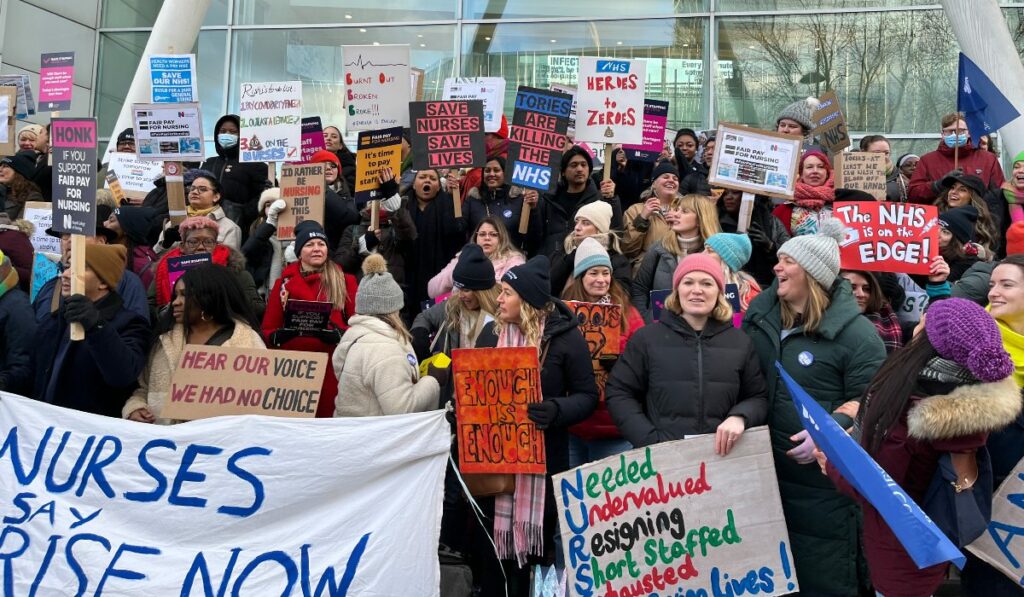
Over 10,000 GMB ambulance workers have announced 6 further days of strike action. GMB members recently voted on and rejected the government’s pay offer of 4%, an offer massively below inflation.
Workers at eight trusts will be on the pickets on 6 February (alongside RCN Nurses who are also striking that day), 20 February, 6 and 20 March. West Midlands ambulance workers will also strike on 23 January alongside Unison and Unite ambulance workers nationally, and North West ambulance staff on 24 January.
This week, on Thursday 19 January over 1,000 Unite ambulance workers in Wales commenced their first day of strike action.
Catherine Sutton, a dispatch assistant said from the Bangor picket line:
“We’ve had a real terms pay cut for the last two years, people are struggling, the pressures the NHS are under… it’s just too much.
“There’s people leaving the service in droves. We need to up the incentives for the staff to stay.”
Unite has now announced its members working in the ambulance service will also strike nationally on 6 February, and regionally on 26 January and 16 February (Northern Ireland), 17 February (West Midlands and Northern Ireland), 20 February (East Midlands, North East and Wales), 22 February (North West), 23-24 February (Northern Ireland), 6 March and 20 March (North West, North East, West Midlands, East Midlands and Wales).
It is hugely significant that ambulance workers are stepping up the action, coordinating across unions, and will strike on 6 February together with the nurses. Hopefully, Unison will also join in and coordinate.
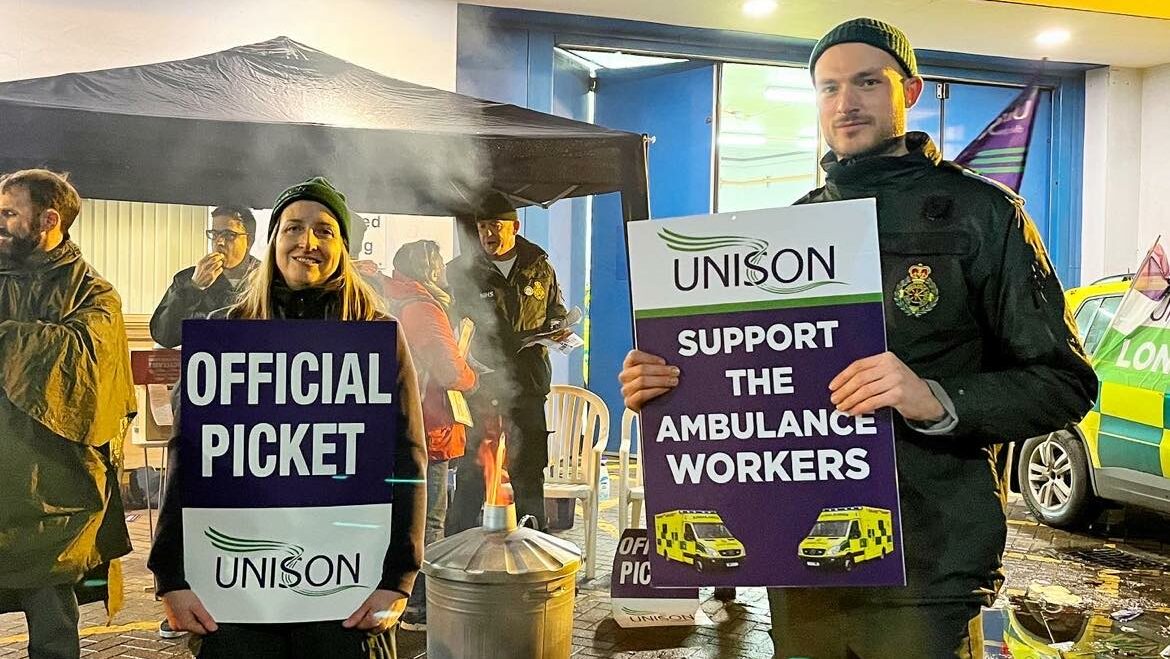
Rank and file bust the union busters
Rank-and-file construction workers celebrated a significant victory over union-busting in Scotland this week.
Dozens of angry construction workers forced the closure of SSE’s Glasgow offices in a protest over the sacking and blacklisting of three electricians by the Kirby Group Engineering company, one of SSE’s sub-contractors in the HV (High Voltage) sector. The lively protest was swelled by a contingent of construction workers from the Merseyside Blacklist Support Group.
Greig MacArthur, one of the 3 reinstated sparks, and Branch Secretary of Unite’s Glasgow Electrical and Mechanical branch, when thanking the protesters for their support, pointed out that the struggle to make construction an industry offering safe and secure employment goes on.
Environment Agency staff take historic strike action
Unison members working at the Environment Agency took strike action on 18 January. This was the first time there has been industrial action at the government agency in its history.
The workers, who maintain flood defences, prevent water pollution and fly tipping voted for strike action after bosses imposed a derisory 2% rise and a one-off payment of £345. They have also been working to rule since December.
Unison’s EA sector committee vice chair Greg Marshall said:
“Our members care deeply about the communities they serve and about protecting the environment we live in. For them, it’s more than just a job. Whether it’s getting up in the middle of the night to build flood barriers or sacrificing their public holidays to attend waste fires or sewage pollutions, they just want to do the right thing.
“But enough is enough, they can’t survive on a derisory 2% pay offer on top of the 21% cut they’ve had over the last 12 years. Our staff deserve a fair pay rise. We need fair pay in the EA.”
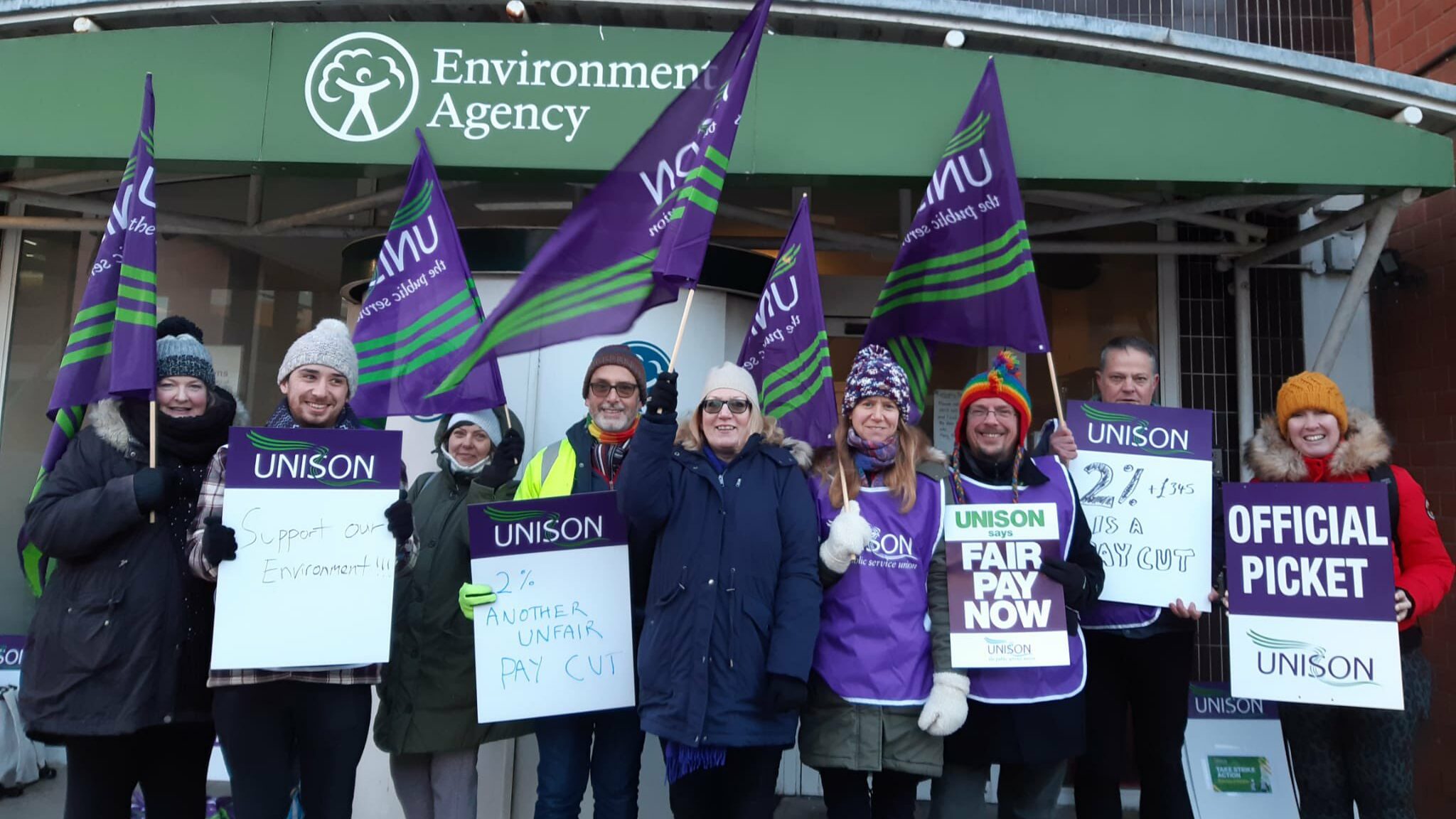
Bus drivers put the brakes on National Express pay con
3,000 bus drivers, members of Unite, working for National Express in the West Midlands have voted by 96% to reject the company’s below inflation offer of 8%, and are currently balloting for strike action.
The action will close National Expresses operations across Birmingham, Walsall, West Bromwich and Coventry. The drivers are particularly angry that, in the words of one driver:
“They think we are thick as cheese. They tell us that the offer is worth 14% – but that’s only because they are adding the 2022 pay rise in as well as the 2023. And they think we will fall for it.”
The drivers could be joined by 200 National Express engineers and fitters, who are also balloting this week, having rejected the company’s offer.
Strike action sees Shelter double their pay offer
Unite members have voted to accept a pay deal after their employer more than doubled their original offer. Around 600 members of the union have been taking strike action at Shelter, the housing and homelessness charity, after they were offered a 3% pay rise.
Through talks with Acas, Shelter revised their offer and put forward a deal that saw a 7% increase in pay and a one-off payment of £1,250. Unite then put this to the members who voted to accept it.
Unite regional officer Peter Storey said:
“Full credit must go to Unite’s reps and members without whose commitment and determination this victory would not have been possible. Unite has emerged from the dispute far stronger at Shelter and it is determined to ensure that members will continue to receive fair pay awards in the future.”
Unite members at Diageo to strike over cuts to new workers’ pay
Workers at drinks giant Diageo’s bottling plant in Leven, Scotland will be staging a series of planned strike action until April in a dispute with the company over introducing lower rates of pay for new starters.
The company, which produces brands including Johnnie Walker, Smirnoff and Guinness, is trying to force a 6% pay cut on some of its engineering staff. The workers, who are represented by Unite the Union, will begin a 48-hour walkout on Saturday 21 January.
Unite general secretary Sharon Graham said:
“Diageo recently recorded £4.4bn in profits which equates to a profit of around £157,000 being generated by every employee. They are awash with billions in profit, so to then attempt to cut our members’ pay is a shocking example of corporate greed. Unite will always stand with our members to protect pay, terms and conditions.”
Unite regional officer Bob Macgregor added:
“Our engineering members who keep the bottling plant safe to operate at Leven have been left with no choice but to take a stand against Diageo – the strike action will continue until they get what they deserve.”
No more Mr Nice Guy
Unison members working for the National Institute for Health and Care Excellence (Nice) staged a one-day strike on 17 January over pay and staffing issues.
Nice staff are also taking 4 days of work to rule action in order to pressure the government to meaningfully engage with healthcare workers to address the crisis in health and social care.
Unison Nice joint branch secretary Trudie Pandolfo, who works on Nice’s public involvement programme, said:
“At NICE, my colleagues and I work with all parts of the NHS – including public health, clinical services, social care – so have a proper bird’s-eye view of just how bad things have become.
“Unless the government acts quickly to boost pay across the NHS, services will soon be unable to function, let alone provide decent patient care. The NHS and the public deserve much better from this government.”
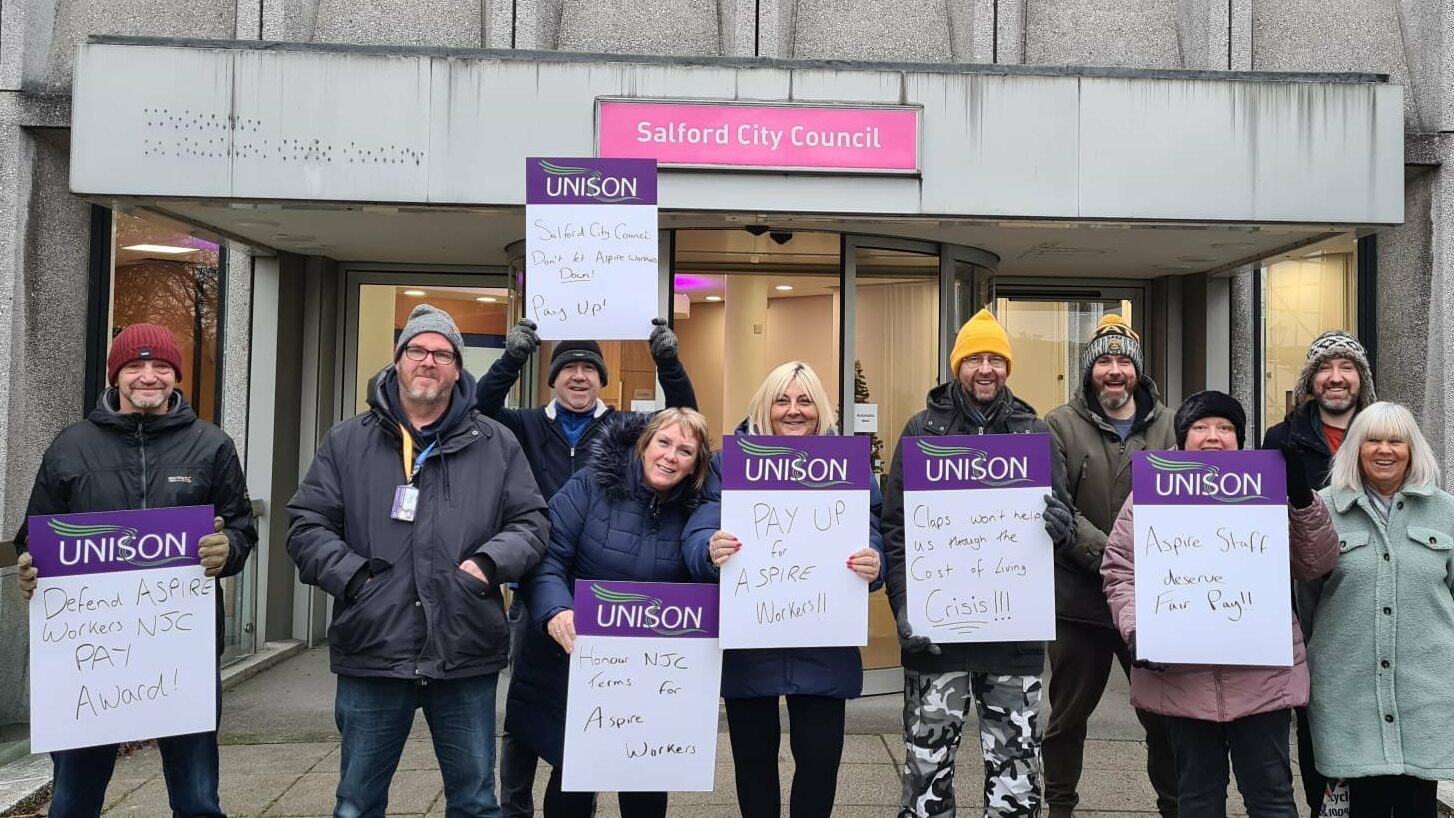
Five things to do this week:
- Get to the Stop the War Trade Union Conference on Saturday
- Build for your local TUC day of action on 1 February
- Find your local KONP protest ahead of 28 January
- Get to your local ambulance picket line on 23 January
- In London, attend the Defend the right to strike rally & action planning meeting on 24 January
Join Revolution! May Day weekender in London
The world is changing fast. From tariffs and trade wars to the continuing genocide in Gaza to Starmer’s austerity 2.0.
Revolution! on Saturday 3 – Sunday 4 May brings together leading activists and authors to discuss the key questions of the moment and chart a strategy for the left.

